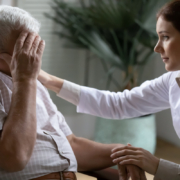Seasonal Affective Disorder (SAD) in Seniors: Recognizing and Managing Symptoms
As the days grow shorter and the cold sets in, many people, especially seniors, may experience a noticeable shift in mood and energy. Known as Seasonal Affective Disorder (SAD), this condition brings feelings of sadness, fatigue, and withdrawal during the darker months of the year. For family caregivers, watching a loved one grapple with these symptoms can be emotionally taxing, especially when balancing other responsibilities. Understanding how to recognize and manage Seasonal Affective Disorder in seniors can make a meaningful difference not only in their quality of life but also in the caregiver’s well-being.
Recognizing the Signs of Seasonal Affective Disorder in Seniors
Seniors experiencing SAD may display changes in behavior that go beyond typical winter blues. Increased isolation, a lack of interest in activities they once enjoyed, disrupted sleep, or changes in appetite are common symptoms. Family caregivers may initially attribute these changes to aging or other health concerns, but it’s important to recognize the seasonal pattern that sets SAD apart. For caregivers, acknowledging these symptoms and understanding the root cause can foster empathy and lead to effective support.
The Emotional Impact on Family Caregivers
Caring for a loved one with SAD often takes a toll on family caregivers as well. It’s not uncommon for caregivers to feel stretched thin, especially when trying to support a senior who may be feeling disconnected or irritable. Tese responsibilities can lead to stress and even a mirrored sense of sadness, especially during the colder months when everyone feels the effects of limited sunlight and reduced activity. Recognizing these shared struggles is the first step toward creating a supportive environment for both the senior and the caregiver.
Practical Ways to Help Seniors Cope with SAD
Family caregivers can help their loved ones by incorporating small, manageable changes into daily routines. Exposure to natural light, encouraging gentle physical activity, and maintaining a regular schedule can make a significant difference. Emotional support also plays a positive role; listening, engaging in conversation, and sharing meaningful activities can help combat the feelings of isolation often brought on by Seasonal Affective Disorder in seniors. However, the demands of caregiving can make it difficult for family members to meet these needs consistently.
How Professional Caregivers Can Lighten the Load
While family caregivers are often the first line of support, professional caregivers can provide an added layer of care, especially when addressing the unique challenges of Seasonal Affective Disorder in seniors. Professionals can offer companionship, monitor symptoms, and ensure daily routines that promote mental and physical well-being are maintained. Having someone skilled in managing SAD not only benefits the senior but also offers respite to family caregivers, providing them the chance to recharge and care for themselves.
A Shared Path to Healing and Support
The effects of Seasonal Affective Disorder (SAD) in seniors reach beyond the individual, creating a ripple effect that touches their loved ones. By understanding the condition and implementing strategies for support, family caregivers can foster an environment of warmth and connection, even during the coldest months. However, it’s equally important to recognize when additional help is needed. Bringing in professional caregivers can not only improve the senior’s quality of life but also provide family members with the relief they need to navigate the season with greater ease.
For family caregivers, offering the best possible care means recognizing their own limits and seeking support when needed. At River Oaks Home Care, we know that together, with the right tools and resources, both seniors and their caregivers can find light in the darkness of winter.
If your loved ones needs professional caregiving help, we provide high-quality, client-centered, and affordable home care services to seniors, allowing them to live healthily and with dignity in their chosen place of residence and in the community. Contact us at: 484.231.1462.




